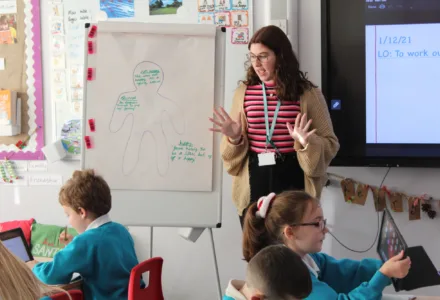Course summary
Have you ever thought about working towards a degree, but decided against it as you are already in employment or volunteering and don’t want to give that up? Our FdA Early Childhood Education in Practice course is designed for those working or volunteering with children 0-8 years in the voluntary, private and independent early years sector or a foundation unit in a school. This course is also for nannies, child minders and those working in Children’s Centres with families of young children.
Please note that this course is taught at Grantham College.
Key facts
|
Award |
FdA |
|---|---|
|
UCAS code |
GX52 |
|
Duration |
2 Years |
|
Mode of study |
Full-time |
|
Start date |
September 2025 |
|
Award |
Bishop Grosseteste University |
|
Institution code |
B38 |
Apply for this course
When you're ready to apply, the route you take will depend on your personal circumstances and preferred method of study. Click the relevant button below to start your application journey.
About this course
This work-based Foundation Degree programme is a combination of practice-based learning and campus-based teaching sessions that take place once a week, allowing you to continue working or volunteering throughout the course. Throughout the two-year programme, you will integrate your previous experience working with young children into your studies.
In your first year, you will study learning principles as an introduction to higher education and analyse the complex link between practice and meeting the needs of children. You will investigate your role in the early years sector to support your professional development, as well as study modules on child development and social interactions to supplement your practical knowledge.
As you go through the second year, you will study modules on inclusion, equality, and diversity, developing and supporting children, and expanding young children's thinking and learning via pedagogy and practice and reflection. You will be able to collaborate with students from other related courses who work in a variety of contexts such as schools and youth services to increase your employability by broadening your perspectives on working with children and young people.
Entry requirements
Typically, a minimum of one year’s experience in practice with a minimum of two days a week (minimum of 12 hours per week accumulating to 360 hours per year of study in a relevant role, either as an employee or a volunteer). In exceptional cases, it might be appropriate to recruit students directly from a Level 3 apprenticeship or another course in which it can be demonstrated that there is a significant element of professional practice. In such a case, this decision will be based on and the suitability of the applicant:
- Typically a Level 3 Diploma, NVQs, access to HE programmes, subject/vocational qualifications;
- Written support from the head teacher/workplace manager in which the applicant works or volunteers.
- Minimum Level 2 Functional skills or equivalent in Maths and English
How you will be taught
This work-focused degree is a combination of practice-based learning and campus-based sessions which run once a week, so that you are able to continue in employment throughout the course. The degree is designed to improve and develop your personal and professional communication skills, allows you to professionalise your approach and further your personal growth.
You will work with a range of experienced academic staff and be supported through peer-led groups, directed tasks and interactive web-based resources.

Assessment
A variety of assessment methods are used including presentations, discussions, debates, poster presentations, essays, portfolios of work, case studies and reflections. All assessments allow you to reflect on your practice and theory as you evidence your learning, building on your personal strengths to develop clear communication skills to share your knowledge and understanding.
Careers & Further study
Many of our Foundation degree graduates take on higher level roles specialising in areas such as family liaison, special education needs, managing settings youth work, mentoring or roles in the wider community and with local authorities. The degree has evolved to respond to the demand for graduate professionals set by the government through the professionalisation of the children’s and youth workforce.
The majority of students advance onto our Top Up Degrees to take their qualifications to honours degree level. Like the Foundation degree, these Top Up Degrees allow you to study and continue to work.
What Our Students Say
Discover what life is like at Bishop Grosseteste University from our students.













































